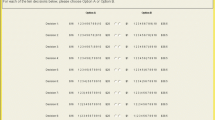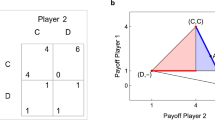Abstract
Thirty male undergraduate subjects played 100 trials of a standard prisoner’s dilemma game under one of three experimental conditions (N = 10 in each): in Condition 1 the Other Player was portrayed as being of higher status than the subjects; in Condition 2, of equal status with the subjects; and in Condition 3, of lower status than the subjects. In reality, in all three conditions, the Other Player was simulated by a probability randomizer previously programmed to play a predetermined strategy. The results indicated that subjects playing with equal-status Others (Condition 2) were significantly more competitive than subjects playing with either higher- or lower-status Others (Conditions 1 and 3). The findings are interpreted in accord with earlier research on individual differences in game behavior.
Similar content being viewed by others
References
ABRIC, J. C., FAUCHEUX, C., MOSCOVICI, S., & PLON, M. 1967. Role de l’image de partenaire sur la cooperation en situation de jeu. Psychologie Francaise, 12, 267–275.
GRANT, M. J., & SERMAT, V. 1969. Status and sex of other as determinants of behaviour in a mixed-motive game. Journal of Personality and Social Psychology, 12, (2), 151–157.
KNIGHT, G. P., & MACK, D. 1973. Race and behaviour in the prisoner’s dilemma game. The Psychological Record, 23, 61–64.
KOMORITA, S. S., SHEPOSH, J. P., & BRAVER, S. L. 1968. Power, the use of power, and cooperative choice in a two-person game. Journal of Personality and Social Psychology, 138–142.
MACK, D. 1975. Skirting the competition. Psychology Today (British Ed.), 8, 38–41.
MACK, D., AUBURN, P. N., & KNIGHT, G. P. 1971. Sex role identification and behaviour in a reiterated prisoner’s dilemma game. Psychonomic Science, 24 (6), 280–282.
MACK, D. & KNIGHT, G. P. 1974. Identification of Other Player’s characteristics in the reiterated prisoner’s dilemma. The Psychological Record, 24 (1), 93–100.
MARLOWE, D., GERGEN, K. J., & DOOB, A. N. 1966. Opponent’s personality, expectation of social interaction, and interpersonal bargaining. Journal of Personality and Social Psychology, 3, 206–213.
MOORE, M. F., & MACK, D. 1972. Dominance-ascendance and behaviour in the reiterated prisoner’s dilemma game. Acta Psychologica, 36 (6), 480–491.
PILISUK, M., & RAPOPORT, A. 1964. A non-zero-sum game model of some disarmament problems. Peace Research Society Papers, 1, 57–58.
RAPOPORT, A., & CHAMMAH, A. M. 1965. Prisoner’s dilemma: A study in conflict and cooperation. Ann Arbor: University of Michigan Press.
SERMAT, V. 1968. Dominance-submissiveness and competition in a mixed-motive game. British Journal of Social and Clinical Psychology, 7, 35–44.
SOLOMON, L. 1960. The influence of some types of power relationships and game strategies upon the development of interpersonal trust. Journal of Abnormal and Social Psychology, 61, 223–230.
Author information
Authors and Affiliations
Rights and permissions
About this article
Cite this article
Mack, D. Status and Behavior in the Reiterated Prisoner’s Dilemma Game. Psychol Rec 26, 529–532 (1976). https://doi.org/10.1007/BF03394420
Published:
Issue Date:
DOI: https://doi.org/10.1007/BF03394420




